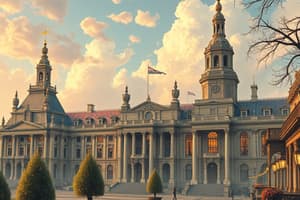Podcast
Questions and Answers
প্লেটো কোন ধরনের শহরের পরিচালনা নিয়ে আলোচনা করেন?
প্লেটো কোন ধরনের শহরের পরিচালনা নিয়ে আলোচনা করেন?
- চুক্তি-আদেশ নিয়ে
- মন্ত্রিবাদী-রাজা নিয়ে
- শাসক-রাজা নিয়ে (correct)
- যাত্রাবাৎ-শাসন নিয়ে
আরিস্টটেল 'রাজনীতি' গ্রন্থে কোন বিষয়ে আলোচনা করেন?
আরিস্টটেল 'রাজনীতি' গ্রন্থে কোন বিষয়ে আলোচনা করেন?
- নীতির ভূমিকা
- সামাজিক চুক্তি
- নাগরিক অংশগ্রহণ
- রাজনীতির ধরন (correct)
মাচিভেলি 'দ্য প্রিন্স' এর মাধ্যমে কোন বিষয়ে প্রাধান্য দেন?
মাচিভেলি 'দ্য প্রিন্স' এর মাধ্যমে কোন বিষয়ে প্রাধান্য দেন?
- রাজার চরিত্র
- নৈতিক মূল্্্্্্্্্্্্্্্্্্্্্্্্া (correct)
- নাগরিক অনুশাসন
- সৎ-রাষ্ট্র
হব্বস, লক, রুসো 'রা 'রা �-------- ----------------------������������������������������ � ����������������� �
হব্বস, লক, রুসো 'রা 'রা �-------- ----------------------������������������������������ � ����������������� �
সংক্ষেপে, পুর্বদর্শী সিদ্ধান্ত উত্পাদনের দুটি প্রধান প্রধান প্রধান পাঠ্যকেন্দ্র কোনটি?
সংক্ষেপে, পুর্বদর্শী সিদ্ধান্ত উত্পাদনের দুটি প্রধান প্রধান প্রধান পাঠ্যকেন্দ্র কোনটি?
'Communist Manifesto' and 'Das Kapital' which challenged the economic foundations of political systems were written by which legendary pair?
'Communist Manifesto' and 'Das Kapital' which challenged the economic foundations of political systems were written by which legendary pair?
নীতিতোষার সিদ্ধান্তে কোন উল্লেখযোগ্য বিষয়গুলি ভরসা হারাচে?
নীতিতোষার সিদ্ধান্তে কোন উল্লেখযোগ্য বিষয়গুলি ভরসা হারাচে?
নীতিতোষার পর্যাোয়োৎ চুন।
নীতিতোষার পর্যাোয়োৎ চুন।
'Social contract' and 'natural rights' are concepts essential to which modern democratic theories?
'Social contract' and 'natural rights' are concepts essential to which modern democratic theories?
'নির্নয়-রো' অনুরাগী তন্ত্র ---?
'নির্নয়-রো' অনুরাগী তন্ত্র ---?
'Global Governance' উৎ্খনিট ্্ గ্ఽఠ్ి ்ఠ ఼ౖఱెు ౼ణ ా఼ ఓె ాణ ఓ ఏవ ౼ణ్ ా౼ ఓె ాణ ఼ౖఱెు ా఼ ఓె ాణ ఏవ ౾ా ా఼ ఓె ాణ ఼ౖఱెు?
'Global Governance' উৎ্খনিট ্্ గ্ఽఠ్ి ்ఠ ఼ౖఱెు ౼ణ ా఼ ఓె ాణ ఓ ఏవ ౼ణ్ ా౼ ఓె ాణ ఼ౖఱెు ా఼ ఓె ాణ ఏవ ౾ా ా఼ ఓె ాణ ఼ౖఱెు?
'Sustainability Politics' ্प: : ౼ణ ా఼ ఓె ాణ ఏవ ిం ౼ణ్ ा౼ ఓ ॊं?
'Sustainability Politics' ্प: : ౼ణ ా఼ ఓె ాణ ఏవ ిం ౼ణ్ ा౼ ఓ ॊं?
Flashcards are hidden until you start studying
Study Notes
Exploring Political Science through its Foundational Concepts: Political Theory
Central to the study of Political Science is political theory, which delves into fundamental questions surrounding government, power, and human behavior. This discipline, rooted in centuries of philosophical contemplation, continues to evolve alongside shifts in society, politics, and technology. Let's navigate some core elements within this field.
Key Figures and Their Ideas
In shaping our understanding of political theory, several legendary intellectuals stand out:
- Plato: Proposing an ideal city ruled by philosopher-kings in his work 'The Republic', Plato laid the foundation for much Western political thought.
- Aristotle: His classic treatise 'Politics' offers insights into types of governments, citizen participation, and the role of virtues in governance.
- Machiavelli: Known best for 'The Prince', Machiavelli explored means to effective rule beyond moral values, often depicted as amoral realism.
- Hobbes, Locke, Rousseau: Each of these thinkers addressed issues such as consent, social contract, and natural rights — all essential to modern democratic theories.
- Marx & Engels: With their communist manifesto and 'Das Kapital', Marx and Engels challenged economic foundations of political systems, spawning critical theory.
- Rawls, Nozick: Modern figures like Rawls (A Theory of Justice) and Nozick ('Anarchy, State, and Utopia') continue to influence contemporary debates around justice, equality, and liberty.
Major Traditions
These influential theories can be categorized under two broad traditions:
- Liberalism: Emphasizing individual freedom, limited government, property rights, civil liberties, and free market economy, liberal ideas shape many current democracies.[1, 2]
- Critical Theory: Originated from Frankfurt School scholars, it challenges existing structures and practices by examining how they serve dominant interests, offering potential alternatives[1, 2].
Contemporary Challenges
As globalization, digital technologies, and environmental concerns transform societies, modern political theory grapples with new problems. Some emerging foci include:
- Democratic Consolidation: Developed countries face difficulties maintaining vibrant political cultures amidst pressures of populism, bureaucracy, and media manipulation.
- Global Governance: As transnational relations expand, theorists ponder forms of supranational authority required for resolving international crises and addressing common goals.
- Digital Politics: A growing area of interest centers upon the impact of digital communication tools, algorithms, data analytics, and artificial intelligence on democracy and citizenship.
- Sustainability Politics: In response to ecological crisis, political scientists question whether established institutions sufficiently protect the environment or if alternative models must emerge.
Political theory remains vital because it encourages us to critically appraise our worldviews, reflect on present arrangements, and consider novel solutions. By studying past masters and engaging with ongoing dilemmas, we equip ourselves with concepts, skills, and perspectives necessary for discussing, advocating, and shaping better futures.
Studying That Suits You
Use AI to generate personalized quizzes and flashcards to suit your learning preferences.




